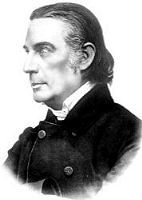The sad experiences which the former Stephanites [the Missourians] had with their hierarch, [Martin] Stephan, have made their hearts very receptive to the doctrine of the ministry held by Luther and subsequent theologians, a teaching also reflected in the Lutheran Symbols, especially since this doctrine not only commends itself highly to the Christian mind but also seems made to order for American circumstances. Conversely, some of us were led by experiences of an opposite and different nature to have an eye for a different conception of ministry and church, a conception which was present already at the time of the Reformation in the church of the Reformers and had been recommended particularly in some parts of southern Germany. Where it differs from the specific-Lutheran and Lutheran-theological course (Richtung), it seems to commend itself by virtue of a more artless attachment to Holy Scripture and antiquity and by greater truth in practice. (Kirchliche Nachrichten aus und über Nord-Amerika, No. 8 [1859]; quoted in C. F. W. Walther, “Do We Draw the Lines of Fellowship Too Narrowly?”, Editorials From “Lehre und Wehre” [Saint Louis: Concordia Publishing House, 1981], pp. 75-76)
Everywhere in the New Testament we see that the holy office begets the Churches, never that the office is merely a transfer of congregational rights and plenary powers, that the Churches confer the office. The office stands in the midst of the Church like a fruitful tree that has its seed in itself. As long as the examination and ordination remains in the hands of the Presbyterium (the pastors), it is right, and can be maintained that it completes itself and propagates itself from person to person, from generation to generation. Those who hold it pass it along, and he to whom its incumbents transfer it holds it as from God. ... The office is a stream of blessing that pours itself from the apostles upon their disciples, and from these onward into future times. (Aphorismen über die neutestamentlichen Ämter [1849], p. 71; quoted in C. A. Hay, “Article V: The Office of the Ministry,” Lectures on the Augsburg Confession [Philadelphia: Lutheran Publication Society, 1888], pp. 172-73)
Observe how entirely different is the appointment of deacons (Acts vi.) from that of pastors! In the case of the latter the congregation is not called into consultation; it lies entirely in the hands of the appointing apostles and evangelists, who, at their discretion, and as occasion may require, take the advice of the congregation or of individual members. On the other hand, at the appointment of the diaconate, the whole congregation is called together, the plan is laid before it – although, it is true, in the form of a command, for the Apostles are the representatives of the Lord – and it gives and testifies its approbation. And now, how are the deacons chosen? According to a standard of qualification laid down by the Apostles, they are elected by the congregation, then placed before the apostles and ordained by them. We may call the Presbyterium a sacred aristocracy of the Church, whilst in the election of the deacons there lies something democratic. (Aphorismen, p. 86; quoted in Hay, p. 173)

Wilhelm Loehe
Note: These quotations are provided for the sake of offering accurate information about the teaching of Wilhelm Loehe on this important topic. In general, we do not endorse or agree with what is said in these quotations.